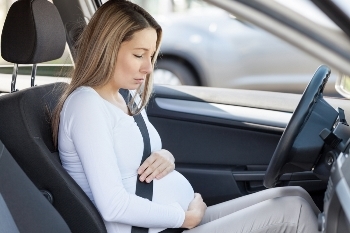While a car accident can cause serious physical and emotional injuries, the results of a crash can be even more severe if the person in the accident is pregnant. Even a minor crash can have life-threatening consequences for a pregnant woman who is driving or is a passenger, and on a developing baby. 
Common Injuries Sustained by Pregnant Women in Car Accidents
Car accidents are a leading cause of fetal death and severe maternal injury. Each year, over 90,000 women and unborn babies sustain problems and injuries as a result of a crash, including:
- Premature birth. A mother may suffer a premature birth as a result of crash trauma. If a mother suffers severe injury or bleeding, doctors may have no choice but to extract the baby before it has fully developed. The stress placed on the mother’s body because of the accident can cause a pre-term birth, and the baby may suffer a variety of health problems.
- Birth defects. An injury to the fetus can cause cognitive problems, physical limitations, and other birth defects. The earlier a baby is born, the higher the risk of disability.
- Placental abruption. Trauma to the abdomen can cause placental abruption—when the placenta becomes detached from the uterine wall. Placental abruption can result in miscarriage, uncontrolled bleeding, and early delivery.
- Shaken baby syndrome. Unborn children in whiplash accidents can suffer “shaken baby syndrome,” also known as coup and contrecoup injuries. A developing fetus may be thrown backward and forward several times within the womb, causing traumatic brain injury as well as trauma to the neck and shoulders.
- Miscarriage. An overwhelming percentage of fetal deaths are caused by car accident trauma. While unborn babies are usually well protected by the cushion of amniotic fluid around them, the sudden impact of a crash can cause the amniotic sac to rupture. If the mother goes into cardiac arrest as a result of her injuries, the infant may die as her body shuts down. Even if both mother and child survive the initial trauma, the baby may still be lost as a result of infections and incomplete development following the crash.
- Hypoxia. Babies rely on a supply of oxygen-rich blood from the mother in order to remain healthy. If the mother suffers blood loss, the baby may suffer oxygen deprivation to the brain, known as hypoxia. Even short-term hypoxia can cause developmental delays and long-term disability, while extended oxygen loss (asphyxia) can cause mortal injury.
Driving and Travel Tips for Pregnant Woman
In order to stay as safe as possible when riding in a car, pregnant women should:
- Keep the steering wheel at least ten inches away from their chest while driving
- Always wear their seat belts (a full shoulder-lap belt is best)
- Perform car safety checks before setting off on each trip
- Move the seat as far back as possible when sitting in the driver or passenger seat
- Sit in the back seat whenever possible
- Always go to the emergency room after an accident, even if there are no immediate signs of injury
Although an expectant mother can take precautions to protect the life of her child, she cannot control the actions of other drivers on the road. If an accident negatively impacted the life of your unborn child, contact our personal injury attorneys today to find out how to hold a negligent driver accountable for your losses. Call us, or use our online contact form to schedule a free consultation.
|
Related links: |

